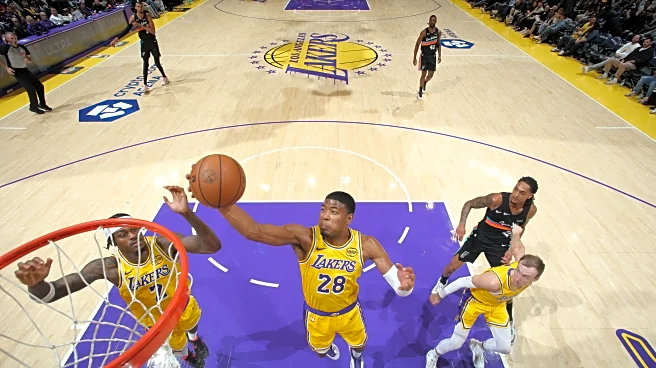What's Happening?
Jaylen Brown is taking on a significant role for the Boston Celtics during the 2025-26 NBA season due to the absence of Jayson Tatum, who is sidelined with a torn Achilles. The Celtics have started the season with a 0-3
record, highlighting the challenges Brown faces in leading the team. Additionally, a viral post on social media platform X, featuring a fake image of Brown with a new haircut, has confused fans. The image was shared by NBA Centel, a parody account, and has garnered around three million views. This account previously went viral for a doctored image of Thunder star Chet Holmgren. The incident underscores the importance of verifying the authenticity of online content.
Why It's Important?
The absence of Jayson Tatum is a significant blow to the Boston Celtics, as he is a key player whose performance greatly influences the team's success. Jaylen Brown's increased responsibilities come at a critical time, and his ability to step up will be crucial for the Celtics' prospects this season. The team's poor start could impact their playoff chances if the trend continues. Furthermore, the viral spread of fake images on social media highlights the challenges of misinformation in the digital age, emphasizing the need for media literacy among fans and the general public.
What's Next?
The Boston Celtics will need to strategize effectively to overcome their current losing streak and adapt to playing without Jayson Tatum. Jaylen Brown's performance will be closely watched as he attempts to fill the void left by Tatum. The team may explore adjustments in their lineup or tactics to improve their performance. Additionally, fans and social media users are likely to become more vigilant in verifying the authenticity of online content, especially from parody accounts that mimic legitimate sources.
Beyond the Headlines
The incident involving the fake image of Jaylen Brown's haircut serves as a reminder of the ethical considerations surrounding digital content creation and sharing. It raises questions about the responsibility of social media platforms in managing parody accounts and the potential consequences of misinformation. As digital media continues to evolve, these issues will remain relevant in discussions about online content regulation and user education.










